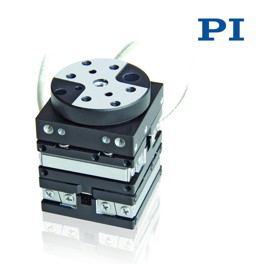Home > Press > PI Group Launches Economical Sub-Miniature Precision Positioning Stages at 2014 Photonics West
 |
Abstract:
PI (Physik Instrumente) LP just introduced a new generation of economical, miniaturized positioning stages with piezo-inertia motor drives at this year's SPIE Photonics West conference. Linear and rotation stages are available in open and closed loop designs.
PI Group Launches Economical Sub-Miniature Precision Positioning Stages at 2014 Photonics West
San Francisco, CA | Posted on February 15th, 2014Small, Self-Locking, Low Power, Nanometer Resolution
The new LPS-22 series of economical mini positioning stages are driven by a compact piezo inertia motor. They are offered with travel ranges of ¼ inch, ½ inch and 1 inch. Featuring dimensions as small as 22x22x10mm, the LPS-22 is one of the smallest precision linear stages currently available on the market.
More Information on PI Motion Controllers and Positioning Systems:
www.pi-usa.us/products/Piezo_Motors_Stages/Linear-Motor-Precision-Positioning.php#LPS45
Open-loop and encoder equipped versions are available enabling resolution down to 1 nm. The optimized piezo motor drive allows for push/pull forces to 3N (1/2 pound) and velocity to 10 mm/sec. The new linear stages can be combined to XY units and rotation can be added in form of the new RPS rotation stages. These ultra-low profile rotators available with diameters of 14, 22 and 32 mm and feature a profile height as low as 7mm. No adapter plates are required for mounting.
Applications
Optics alignment & assembly, photonics, microscopy, beam-line instrumentation, medical engineering and bio-technology
Why PIShift Piezo Inertia Motors?
The integrated PIShift type piezo ceramic inertia motors provide several advantages over classical motor drives: smaller, lower energy consumption, nanometer resolution and self-locking, i.e. at the end of each move, the stage locks its platform into place with no drift and no current draw. This provides better stability and removes the need for a motor brake.
Options, Drive Electronics
The stages are available in open-loop versions and with direct encoders for closed-loop operation. Vacuum and non-magnetic designs are also available. Several drive options from OEM driver boards to closed-loop servo controllers with USB interface are offered. Custom designs are also available.
####
About Physik Instrumente (PI)
PI is a leading manufacturer of precision motion control equipment, piezo systems, piezo motors and actuators for photonics, bio-nanotechnology, medical engineering & semiconductor applications. PI has been developing and manufacturing standard & custom precision products with piezoceramic and electromagnetic drives for 4 decades. The company has been ISO 9001 certified since 1994 and provides innovative, high-quality solutions for OEM and research. PI is present worldwide with eight subsidiaries, R&D / engineering on 3 continents and total staff of 750+
For more information, please click here
Contacts:
STEFAN VONDRAN
Copyright © Physik Instrumente (PI)
If you have a comment, please Contact us.Issuers of news releases, not 7th Wave, Inc. or Nanotechnology Now, are solely responsible for the accuracy of the content.
| Related News Press |
News and information
![]() Simulating magnetization in a Heisenberg quantum spin chain April 5th, 2024
Simulating magnetization in a Heisenberg quantum spin chain April 5th, 2024
![]() NRL charters Navy’s quantum inertial navigation path to reduce drift April 5th, 2024
NRL charters Navy’s quantum inertial navigation path to reduce drift April 5th, 2024
![]() Discovery points path to flash-like memory for storing qubits: Rice find could hasten development of nonvolatile quantum memory April 5th, 2024
Discovery points path to flash-like memory for storing qubits: Rice find could hasten development of nonvolatile quantum memory April 5th, 2024
Announcements
![]() NRL charters Navy’s quantum inertial navigation path to reduce drift April 5th, 2024
NRL charters Navy’s quantum inertial navigation path to reduce drift April 5th, 2024
![]() Discovery points path to flash-like memory for storing qubits: Rice find could hasten development of nonvolatile quantum memory April 5th, 2024
Discovery points path to flash-like memory for storing qubits: Rice find could hasten development of nonvolatile quantum memory April 5th, 2024
Tools
![]() Ferroelectrically modulate the Fermi level of graphene oxide to enhance SERS response November 3rd, 2023
Ferroelectrically modulate the Fermi level of graphene oxide to enhance SERS response November 3rd, 2023
![]() The USTC realizes In situ electron paramagnetic resonance spectroscopy using single nanodiamond sensors November 3rd, 2023
The USTC realizes In situ electron paramagnetic resonance spectroscopy using single nanodiamond sensors November 3rd, 2023
Events/Classes
![]() Researchers demonstrate co-propagation of quantum and classical signals: Study shows that quantum encryption can be implemented in existing fiber networks January 20th, 2023
Researchers demonstrate co-propagation of quantum and classical signals: Study shows that quantum encryption can be implemented in existing fiber networks January 20th, 2023
|
|
||
|
|
||
| The latest news from around the world, FREE | ||
|
|
||
|
|
||
| Premium Products | ||
|
|
||
|
Only the news you want to read!
Learn More |
||
|
|
||
|
Full-service, expert consulting
Learn More |
||
|
|
||








